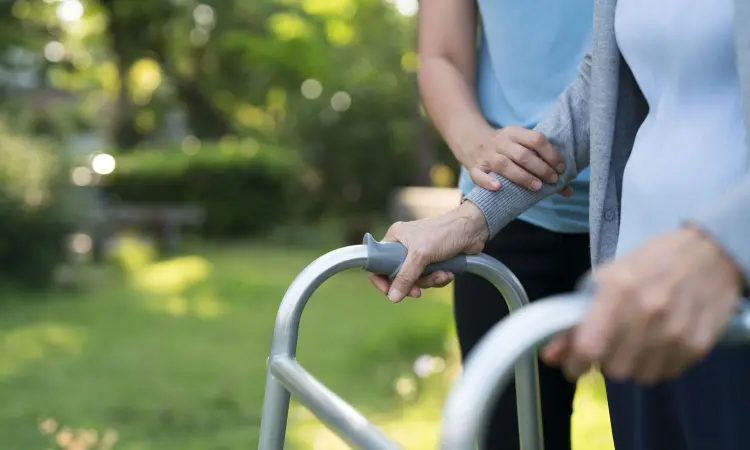- Home
- Medical news & Guidelines
- Anesthesiology
- Cardiology and CTVS
- Critical Care
- Dentistry
- Dermatology
- Diabetes and Endocrinology
- ENT
- Gastroenterology
- Medicine
- Nephrology
- Neurology
- Obstretics-Gynaecology
- Oncology
- Ophthalmology
- Orthopaedics
- Pediatrics-Neonatology
- Psychiatry
- Pulmonology
- Radiology
- Surgery
- Urology
- Laboratory Medicine
- Diet
- Nursing
- Paramedical
- Physiotherapy
- Health news
- Fact Check
- Bone Health Fact Check
- Brain Health Fact Check
- Cancer Related Fact Check
- Child Care Fact Check
- Dental and oral health fact check
- Diabetes and metabolic health fact check
- Diet and Nutrition Fact Check
- Eye and ENT Care Fact Check
- Fitness fact check
- Gut health fact check
- Heart health fact check
- Kidney health fact check
- Medical education fact check
- Men's health fact check
- Respiratory fact check
- Skin and hair care fact check
- Vaccine and Immunization fact check
- Women's health fact check
- AYUSH
- State News
- Andaman and Nicobar Islands
- Andhra Pradesh
- Arunachal Pradesh
- Assam
- Bihar
- Chandigarh
- Chattisgarh
- Dadra and Nagar Haveli
- Daman and Diu
- Delhi
- Goa
- Gujarat
- Haryana
- Himachal Pradesh
- Jammu & Kashmir
- Jharkhand
- Karnataka
- Kerala
- Ladakh
- Lakshadweep
- Madhya Pradesh
- Maharashtra
- Manipur
- Meghalaya
- Mizoram
- Nagaland
- Odisha
- Puducherry
- Punjab
- Rajasthan
- Sikkim
- Tamil Nadu
- Telangana
- Tripura
- Uttar Pradesh
- Uttrakhand
- West Bengal
- Medical Education
- Industry
Sarcopenia Increases Risk of Gestational Diabetes Mellitus: Study Highlights New Causal Link

China: A recent study published in the International Journal of Women's Health has shed light on the potential causal relationship between sarcopenia and gestational diabetes mellitus (GDM), revealing significant insights that could influence future clinical management and intervention strategies. The study found that sarcopenia raises the risk of gestational diabetes mellitus.
"Key indicators of sarcopenia, such as appendicular lean mass (HR = 1.22), grip strength (HR = 1.42 for the right hand, HR = 1.61 for the left hand), and walking pace (HR = 3.37), were associated with an increased risk of developing GDM. However, GDM did not appear to have any impact on sarcopenia, highlighting sarcopenia as a potential risk factor for the condition," the researchers reported.
Sarcopenia, often associated with aging, is increasingly recognized as a condition that can affect a wide range of individuals, including pregnant women. The condition is characterized by a decline in muscle function, leading to reduced mobility, increased frailty, and a greater risk of metabolic disorders. On the other hand, GDM is a type of diabetes that develops during pregnancy and is associated with various health risks for both the mother and the baby, including preeclampsia, premature birth, and a higher likelihood of developing type 2 diabetes later in life.
Against the above background, Dongyu Wang, Guangdong Provincial Clinical Research Center for Obstetrical and Gynecological Diseases, Guangzhou, People’s Republic of China, and colleagues employed a bi-directional Mendelian randomization (MR) approach to investigate this complex relationship.
For this purpose, the researchers used data from FinnGen datasets and genome-wide association studies. They conducted a bi-directional MR study, starting with a forward MR analysis to assess the causal effect of sarcopenia on GDM risk, with sarcopenia-related traits as exposures and GDM as the outcome. In the reverse MR analysis, they evaluated whether GDM influenced sarcopenia-related traits. Finally, a sensitivity analysis was performed to test the robustness of the MR findings.
The study revealed the following findings:
- Forward MR analysis found that appendicular lean mass was associated with an increased risk of GDM (OR = 1.2182).
- Right-hand grip strength was linked to a higher risk of GDM (OR = 1.4194).
- Left-hand grip strength showed a significant association with increased GDM risk (OR = 1.6064).
- Usual walking pace was also associated with a higher risk of GDM (OR = 3.3676).
- Reverse MR results indicated that GDM had no causal effect on sarcopenia.
- There was no pleiotropy in the analysis.
"Our study provides further evidence that sarcopenia contributes to the development of gestational diabetes mellitus (GDM), while GDM does not have a causal effect on sarcopenia. This insight paves the way for targeted interventions and personalized care to help reduce the risk of GDM in pregnant individuals," the researchers wrote.
"Additional research is needed to better understand the complex physiological pathways involved and to develop effective prevention and management strategies," they concluded.
Reference:
Huang, Y., Zhao, S., Hong, J., Shen, L., Wang, Z., & Wang, D. (2025). Causal Associations Between Sarcopenia and Gestational Diabetes Mellitus. International Journal of Women’s Health, 17, 259–269. https://doi.org/10.2147/IJWH.S494910
Dr Kamal Kant Kohli-MBBS, DTCD- a chest specialist with more than 30 years of practice and a flair for writing clinical articles, Dr Kamal Kant Kohli joined Medical Dialogues as a Chief Editor of Medical News. Besides writing articles, as an editor, he proofreads and verifies all the medical content published on Medical Dialogues including those coming from journals, studies,medical conferences,guidelines etc. Email: drkohli@medicaldialogues.in. Contact no. 011-43720751


